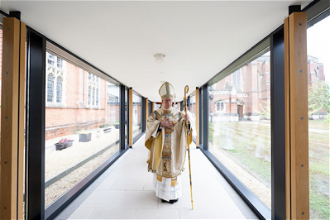Bishop Egan: 'secularism is a totally inadequate basis for British Society'

Bishop Philip Egan
In a lecture given at Kings College London on Thursday 6 March, Bishop Philip Egan of Portsmouth said that secularism is a totally inadequate basis for British society in the 21st century. “Secularism is too flimsy a basis for British culture. It cannot guarantee human flourishing nor sustain the advances the British people have achieved.”
Secularism is too “fragile a basis for a free society.” Only the Gospel can offer an “authentic humanism able to transform human living.” The danger about what is happening at the moment among politicians, policy-makers and the law is that “secularism is producing a society without foundations, one that develops randomly on the hoof through pressure-groups, legal precedent and political expediency.”
The title of the lecture was “Irrelevant? Should Christianity still have a voice in the public square?” Bishop Egan was an undergraduate at Kings in the late 70s. It was the first time he had returned to Kings and was delighted to accept the invitation from Fr Joe Evans, the Catholic Chaplain. The lecture was attended by members of CathSoc, the Anglican Chaplain and Assistants, students and university staff.
Bishop Egan defined what is meant by secularism and charted the decline of Christianity in Britain, particularly since the social and sexual revolutions of the ‘Swinging Sixties,’ which brought the collapse of the traditional family.
He also explored three writings of Pope Benedict that form a kind of ‘triptych’: the Address at Westminster Hall during the Papal Visit of 2010, the controversial Regensburg Lecture on ‘Faith and Reason’ from 2006 and the speech on the foundations of law to the Bundestag, Berlin in 2011.
Secularism in Britain, Bishop Egan stated, ring-fences religion to the private domain, thus dissolving the ground of public ethics and the basis of law in right reason. This is turn allows harmful ideologies to come in that victimise the weak, especially the unborn child, the elderly and the dying. Secularism is clearly unable to support “stable marriages and family life.” Secularists are now beginning to place restrictions on religious freedom because secularism has a natural “tendency towards greater surveillance and state-control”.
Secularism is a wholly inadequate basis for a sound society.
This is why, the Bishop concluded, the Church must propose to twenty-first century Britain its saving message, which is “an authentic humanism able to ground a free, democratic and pluralist society.”
Christians must conduct the new evangelisation of Britain with new ardour and enormous creativity, Bishop Egan argued. We need a new “Catholic apologetics, able to rebut popular myths about science, so that schoolchildren can appreciate the interaction of faith and reason, the complementarity of religion and science, and the redemptive role of religion within human living.”
We need to “retrieve and promote Britain’s Christian patrimony, its history, art and architecture, its music and literature, its liturgy, theology and ethics.” This includes promoting “a greater knowledge of the Bible, which underpins so much of English literature” and “a greater knowledge of the history of the Church in Britain,” especially of the saints who helped develop the Christian character of these islands.
For the full text of the lecture, see: www.portsmouthdiocese.org.uk/bishop/docs/BoP-140306-talk.pdf
Bishop Philip Egan was ordained eighth Bishop of Portsmouth on 24th September 2012. Born in Altrincham, Cheshire, and a graduate of University of London (King’s College), he undertook his formation for the priesthood at Allen Hall, London and the Venerable English College, Rome. He gained his Licentiate in Sacred Theology (STL) from the Pontifical Gregorian University in 1985 and later, a doctorate in theology (PhD) from the University of Birmingham.
Formerly a priest of the Diocese of Shrewsbury, he served as assistant priest in Woodhouse Park (1985-8), as assistant chaplain at Fisher House to the University of Cambridge (1988-91 and chaplain to Arrowe Park Hospital, Wirral (1991-4). For twelve years, he was on the formation staff of St. Mary’s College, Oscott, where he was the College’s Dean of Studies and Professor of Fundamental Theology. He returned to Boston College in 2007 as a post-doctoral research fellow of the Lonergan Institute, before becoming Parish Priest of Our Lady and St Christopher’s, Romiley. In 2010, he became Vicar General of the Diocese of Shrewsbury, a Prelate of Honour and a Canon of Shrewsbury Cathedral.
Bishop Philip has regularly contributed to theological journals and religious magazines, and written about the thought of Blessed John Henry Cardinal Newman and the Jesuit philosopher Bernard Lonergan SJ. Amongst his publications is Philosophy and Catholic Theology: A Primer (Collegeville, 2009).


















